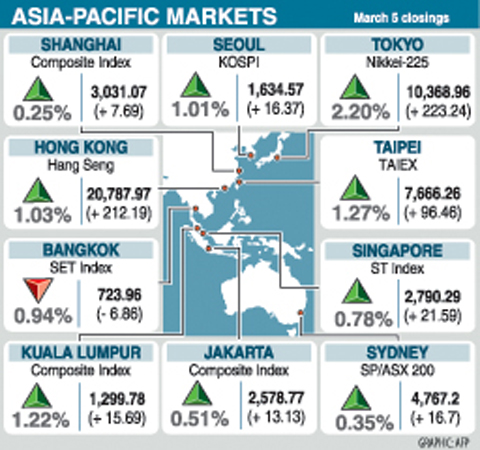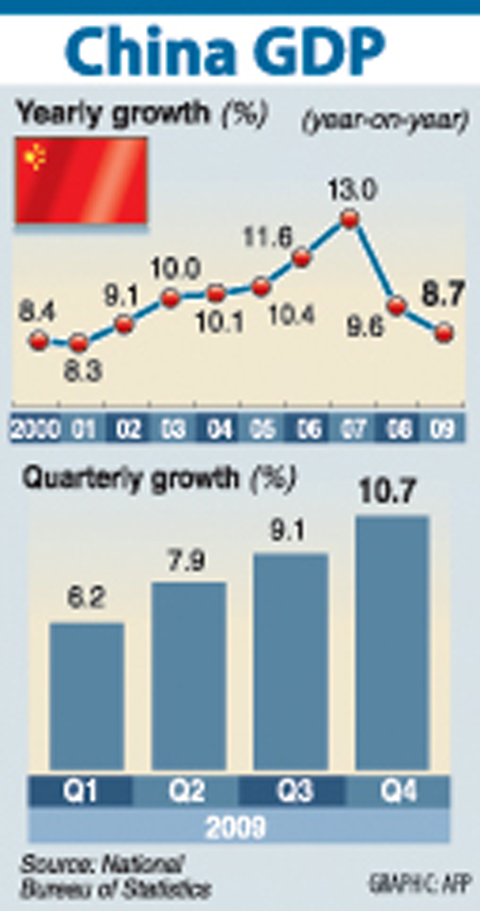Asian stocks rose for a second week, almost erasing the MSCI Asia-Pacific Index’s losses this year, as reports on global semiconductor sales, Indian manufacturing and US jobless claims boosted optimism for an economic revival.
Rio Tinto Group, the world’s third-biggest mining company, gained 6.4 percent in Sydney as metal prices climbed on speculation a recovery will boost demand for metals. Sumco Corp jumped 9.3 percent, leading gains by chip-related stocks. Li & Fung Ltd (利豐), the biggest supplier for retailers including Wal-Mart Stores Inc, and Canon Inc, which gets about 27 percent of sales from the US, advanced more than 5 percent. Tata Motors Ltd, India’s biggest truckmaker, surged 12 percent.
“There’s been quite an abundance of leading indicators pointing to an improving employment backdrop,” said Nader Naeimi, an investment strategist in Sydney at AMP Capital Investors, which oversees about US$90 billion globally. “Jobs are key to the sustainability of the recovery.”

The MSCI Asia-Pacific Index gained 1.9 percent this week, paring its decline this year to 0.1 percent. The gauge has lost 5.1 percent since reaching a 17-month high on Jan. 15 amid concern governments will start withdrawing economic-stimulus measures and that Greece may struggle to curb its budget deficit.
Japan’s Nikkei 225 Stock Average increased 2.4 percent, its largest gain this year. India’s Sensitive Index surged 3.4 percent, this week’s biggest advance among benchmarks in the Asia-Pacific region, after reports showed the nation’s exports and manufacturing output climbed.
China’s Shanghai Composite Index slipped 0.7 percent on concern bank lending may slow and interest rates will rise as inflation accelerates. Hong Kong’s Hang Seng Index rose 0.9 percent. Australia’s S&P/ASX 200 Index increased 2.8 percent even as the nation’s central bank raised its benchmark interest rate to 4 percent from 3.75 percent on March 2.

Raw-material suppliers advanced the most this week among the MSCI Asia-Pacific Index’s 10 industry groups, followed by information-technology companies, on speculation a global recovery will boost demand for commodities.
The MSCI Asia-Pacific Index on Friday rose the most this week, after a US Labor Department report showed the country’s claims for jobless benefits dropped in the week ended Feb. 27 and the yen weakened against the dollar on speculation the Bank of Japan will further ease monetary policies.
India’s government said on March 2 that the country’s exports rose for a third consecutive month in January, while a report on March 1 showed South Korea’s exports rose for a fourth month in February. A report the same day showed Japan’s unemployment rate unexpectedly fell to a 10-month low in January.
Li & Fung, which gets 62 percent of sales from the US, climbed 8.7 percent to HK$39.25. Billabong Ltd, the Australian surf-wear maker that gets half of sales from the US, gained 4.8 percent to A$10.66. Canon, which is the world’s biggest camera maker and gets 28 percent of its sales in the Americas, increased 5.3 percent to ¥3,890.
The MSCI Asia-Pacific Index surged 34 percent last year as governments worldwide boosted spending and central banks lowered interest rates to help restore economies battered by the global recession. This year, potential gains have been weighed down by concern governments from China to the US and India will tighten lending and withdraw stimulus policies amid signs the recovery is continuing.

FALSE DOCUMENTS? Actor William Liao said he was ‘voluntarily cooperating’ with police after a suspect was accused of helping to produce false medical certificates Police yesterday questioned at least six entertainers amid allegations of evasion of compulsory military service, with Lee Chuan (李銓), a member of boy band Choc7 (超克7), and actor Daniel Chen (陳大天) among those summoned. The New Taipei City District Prosecutors’ Office in January launched an investigation into a group that was allegedly helping men dodge compulsory military service using falsified medical documents. Actor Darren Wang (王大陸) has been accused of being one of the group’s clients. As the investigation expanded, investigators at New Taipei City’s Yonghe Precinct said that other entertainers commissioned the group to obtain false documents. The main suspect, a man surnamed

DEMOGRAPHICS: Robotics is the most promising answer to looming labor woes, the long-term care system and national contingency response, an official said Taiwan is to launch a five-year plan to boost the robotics industry in a bid to address labor shortages stemming from a declining and aging population, the Executive Yuan said yesterday. The government approved the initiative, dubbed the Smart Robotics Industry Promotion Plan, via executive order, senior officials told a post-Cabinet meeting news conference in Taipei. Taiwan’s population decline would strain the economy and the nation’s ability to care for vulnerable and elderly people, said Peter Hong (洪樂文), who heads the National Science and Technology Council’s (NSTC) Department of Engineering and Technologies. Projections show that the proportion of Taiwanese 65 or older would

Democracies must remain united in the face of a shifting geopolitical landscape, former president Tsai Ing-wen (蔡英文) told the Copenhagen Democracy Summit on Tuesday, while emphasizing the importance of Taiwan’s security to the world. “Taiwan’s security is essential to regional stability and to defending democratic values amid mounting authoritarianism,” Tsai said at the annual forum in the Danish capital. Noting a “new geopolitical landscape” in which global trade and security face “uncertainty and unpredictability,” Tsai said that democracies must remain united and be more committed to building up resilience together in the face of challenges. Resilience “allows us to absorb shocks, adapt under

Taiwan Semiconductor Manufacturing Co (TSMC, 台積電) yesterday said it is building nine new advanced wafer manufacturing and packaging factories this year, accelerating its expansion amid strong demand for high-performance computing (HPC) and artificial intelligence (AI) applications. The chipmaker built on average five factories per year from 2021 to last year and three from 2017 to 2020, TSMC vice president of advanced technology and mask engineering T.S. Chang (張宗生) said at the company’s annual technology symposium in Hsinchu City. “We are quickening our pace even faster in 2025. We plan to build nine new factories, including eight wafer fabrication plants and one advanced